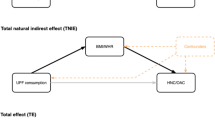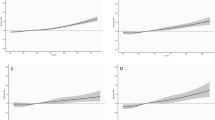Abstract
Purpose
Two prior cohort studies suggested that choline, but not betaine intake, is associated with an increased risk of advanced prostate cancer (PCa). Given that evidence remains limited, we evaluated whether intakes of choline and derivative betaine are associated with total and lethal PCa risk and PCa death in men with PCa.
Methods
We included 6,528 men (24.4% African American) without a cancer diagnosis at baseline (1987–1989) followed through 2012. Dietary intake was assessed using a food frequency questionnaire coupled with a nutrient database. We used Cox proportional hazards regression to estimate hazards ratios (HRs) and 95% confidence intervals (CIs) of total and lethal PCa risk overall and by race.
Results
Choline intake was not associated with total (n = 811) or lethal (n = 95) PCa risk overall or by race. Betaine intake was inversely associated with lethal (tertile 3 vs 1, HR 0.59, 95% CI 0.35–1.00, p trend = 0.04), but not total PCa risk; patterns for lethal PCa were similar by race. Neither nutrient was associated with PCa death in men with PCa.
Conclusions
Choline intake was not associated with total or lethal PCa or with PCa death in men with PCa. Betaine intake was inversely associated with lethal, but not total PCa risk or with PCa death in men with PCa. Our results do not support the hypothesis that higher choline intake increases lethal PCa risk, but do suggest that higher betaine intake may be associated with lower lethal PCa risk. Further investigation with a larger number of lethal cases is needed.
Similar content being viewed by others
References
Newberne PM, Rogers AE (1986) Labile methyl groups and the promotion of cancer. Annu Rev Nutr 6(1):407–432. https://doi.org/10.1146/annurev.nu.06.070186.002203
Balassiano K, Lima S, Jenab M, Overvad K, Tjonneland A, Boutron-Ruault MC, Clavel-Chapelon F, Canzian F, Kaaks R, Boeing H, Meidtner K, Trichopoulou A, Laglou P, Vineis P, Panico S, Palli D, Grioni S, Tumino R, Lund E, Bueno-de-Mesquita HB, Numans ME, Peeters PHM, Ramon Quirós J, Sánchez Ma-J, Navarro C, Ardanaz E, Dorronsoro M, Hallmans G, Stenling R, Ehrnström R, Regner S, Allen NE, Travis RC, Khaw K-T, Offerhaus GJA, Sala N, Riboli E, Hainaut P, Scoazec J-Y, Sylla BS, Gonzalez CA, Herceg Z (2011) Aberrant DNA methylation of cancer-associated genes in gastric cancer in the European Prospective Investigation into Cancer and Nutrition (EPIC–EURGAST). Cancer Lett 311(1):85–95. https://doi.org/10.1016/j.canlet.2011.06.038
Johansson M, Van Guelpen B, Vollset SE, Hultdin J, Bergh A, Key T, Midttun O, Hallmans G, Ueland PM, Stattin P (2009) One-carbon metabolism and prostate cancer risk: prospective investigation of seven circulating B vitamins and metabolites. Cancer Epidemiol Biomark Prev 18(5):1538–1543. https://doi.org/10.1158/1055-9965.EPI-08-1193
Keshari KR, Tsachres H, Iman R, Delos Santos L, Tabatabai ZL, Shinohara K, Vigneron DB, Kurhanewicz J (2011) Correlation of phospholipid metabolites with prostate cancer pathologic grade, proliferative status and surgical stage-impact of tissue environment. NMR Biomed 24(6):691–699. https://doi.org/10.1002/nbm.1738
Müller SA, Holzapfel K, Seidl C, Treiber U, Krause BJ, Senekowitsch-Schmidtke R (2009) Characterization of choline uptake in prostate cancer cells following bicalutamide and docetaxel treatment. Eur J Nucl Med Mol Imaging 36(9):1434–1442. https://doi.org/10.1007/s00259-009-1117-x
Lee J, Sato MM, Coel MN, Lee K-H, Kwee SA (2016) Prediction of PSA progression in castration-resistant prostate cancer based on treatment-associated change in tumor burden quantified by 18F-fluorocholine PET/CT. J Nucl Med 57(7):1058–1064. https://doi.org/10.2967/jnumed.115.169177
Li R, Ravizzini GC, Gorin MA, Maurer T, Eiber M, Cooperberg MR, Alemozzaffar M, Tollefson MK, Delacroix SE, Chapin BF (2018) The use of PET/CT in prostate cancer. Prostate Cancer Prostatic Dis 21(1):4–21. https://doi.org/10.1038/s41391-017-0007-8
Richman EL, Kenfield SA, Stampfer MJ, Giovannucci EL, Zeisel SH, Willett WC, Chan JM (2012) Choline intake and risk of lethal prostate cancer: incidence and survival. Am J Clin Nutr 96(4):855–863. https://doi.org/10.3945/ajcn.112.039784
ARIC Investigators (1989) The Atherosclerosis Risk in Communities (ARIC) study: design and objectives. Am J Epidemiol 129(4):687–702. https://doi.org/10.1093/oxfordjournals.aje.a115184
Bidulescu A, Chambless LE, Siega-Riz A, Zeisel SH, Heiss G (2007) Usual choline and betaine dietary intake and incident coronary heart disease: the Atherosclerosis Risk in Communities (ARIC) Study. BMC Cardiovasc Disord 7(1):1–8. https://doi.org/10.1186/1471-2261-7-20
Meyer A-M, Evenson KR, Couper DJ, Stevens J, Pereria MA, Heiss G (2008) Television, physical activity, diet, and body weight status: the ARIC cohort. Int J Behav Nutr Phys Act 5(1):68. https://doi.org/10.1186/1479-5868-5-68
Willett WC, Sampson L, Stampfer MJ, Rosner B, Bain C, Witschi J, Hennekens CH, Speizer FE (1985) Reproducibility and validity of a semiquantitative food frequency questionnaire. Am J Epidemiol 122(1):51–65. https://doi.org/10.1093/oxfordjournals.aje.a114086
(dataset) Patterson KY, Bhagwat SA, Williams JR, Howe JC, Holden JM, Zeisel SH, Dacosta KA, Mar M-H (2015) USDA database for the choline content of common foods, release 2 (2008). Nutrient Data Laboratory. Beltsville Human Nutrition Research Center, ARS. https://doi.org/10.15482/USDA.ADC/1178141
Bidulescu A, Chambless LE, Siega-Riz A, Zeisel SH, Heiss G (2009) Repeatability and measurement error in the assessment of choline and betaine dietary intake: the Atherosclerosis Risk in Communities (ARIC) study. Nutr J 8(1):1–6. https://doi.org/10.1186/1475-2891-8-14
Joshu CE, Barber JR, Coresh J, Couper DJ, Mosley TH, Vitolins MZ, Butler KR, Nelson HH, Prizment AE, Selvin E, Tooze JA, Visvanathan K, Folsom AR, Platz EA (2018) Enhancing the infrastructure of the Atherosclerosis Risk in Communities (ARIC) study for cancer epidemiology research: ARIC cancer. Cancer Epidemiol Biomark Prev 27(3):295–305. https://doi.org/10.1158/1055-9965.epi-17-0696
Willett WC, Howe GR, Kushi LH (1997) Adjustment for total energy intake in epidemiologic studies. Am J Clin Nutr 65(4):1220S–1228S. https://doi.org/10.1093/ajcn/65.4.1220S
Laird PW, Jaenisch R (1994) DNA methylation and cancer. Hum Mol Genet 3(suppl_1):1487–1495. https://doi.org/10.1093/hmg/3.suppl_1.1487
Institute of Medicine (1998) Dietary reference intakes for thiamin, riboflavin, niacin, vitamin B6, folate, vitamin B12, pantothenic acid, biotin, and choline. The National Academies Press, Washington, DC. https://doi.org/10.17226/6015
Wallace TC, Fulgoni VL (2016) Assessment of total choline intakes in the United States. J Am Coll Nutr 35(2):108–112. https://doi.org/10.1080/07315724.2015.1080127
Jones PA (1986) DNA methylation and cancer. Cancer Res 46(2):461–466
Davis CD, Uthus EO (2004) DNA methylation, cancer susceptibility, and nutrient interactions. Exp Biol Med (Maywood) 229(10):988–995. https://doi.org/10.1177/153537020422901002
Niculescu MD, Zeisel SH (2002) Diet, methyl donors and DNA methylation: interactions between dietary folate, methionine and choline. J Nutr 132(8):2333S–2335S. https://doi.org/10.1093/jn/132.8.2333S
Nitter M, Norgard B, de Vogel S, Eussen SJ, Meyer K, Ulvik A, Ueland PM, Nygard O, Vollset SE, Bjorge T, Tjonneland A, Hansen L, Boutron-Ruault M, Racine A, Cottet V, Kaaks R, Kuhn T, Trichopoulou A, Bamia C, Naska A, Grioni S, Palli D, Panico S, Tumino R, Vineis P, Bueno-de-Mesquita HB, van Kranen H, Peeters PH, Weiderpass E, Dorronsoro M, Jakszyn P, Sanchez M, Arguelles M, Huerta JM, Barricarte A, Johansson M, Ljuslinder I, Khaw K, Wareham N, Freisling H, Duarte-Salles T, Stepien M, Gunter MJ, Riboli E (2014) Plasma methionine, choline, betaine, and dimethylglycine in relation to colorectal cancer risk in the European Prospective Investigation into Cancer and Nutrition (EPIC). Ann Oncol 25(8):1609–1615. https://doi.org/10.1093/annonc/mdu185
Ying J, Rahbar MH, Hallman DM, Hernandez LM, Spitz MR, Forman MR, Gorlova OY (2013) Associations between dietary intake of choline and betaine and lung cancer risk. PLoS ONE 8(2):e54561. https://doi.org/10.1371/journal.pone.0054561
Acknowledgments
The authors thank the staff and participants of the ARIC study for their important contributions. Cancer incidence data have been provided by the Maryland Cancer Registry, Center for Cancer Surveillance and Control, Maryland Department of Health, 201W. Preston Street, Room 400, Baltimore, MD 21201. We acknowledge the State of Maryland, the Maryland Cigarette Restitution Fund, and the National Program of Cancer Registries (NPCR) of the Centers for Disease Control and Prevention (CDC) for the funds that helped support the availability of the cancer registry data.
Funding
The Atherosclerosis Risk in Communities study has been funded in whole or in part with Federal funds from the National Heart, Lung, and Blood Institute, National Institutes of Health, Department of Health and Human Services, under Contract Nos. (HHSN268201700001I, HHSN268201700003I, HHSN268201700005I, HHSN268201700004I, HHSN268201700002I). Studies on cancer in ARIC are also supported by the National Cancer Institute (U01 CA164975). This work was additionally supported by P30 CA006973 and P30 DK056350. CE Joshu received support from the Prostate Cancer Foundation. The content of this work is solely the responsibility of the authors and does not necessarily represent the official views of the National Institutes of Health.
Author information
Authors and Affiliations
Corresponding author
Additional information
Publisher’s Note
Springer Nature remains neutral with regard to jurisdictional claims in published maps and institutional affiliations.
Electronic supplementary material
Below is the link to the electronic supplementary material.
Rights and permissions
About this article
Cite this article
Han, P., Bidulescu, A., Barber, J.R. et al. Dietary choline and betaine intakes and risk of total and lethal prostate cancer in the Atherosclerosis Risk in Communities (ARIC) Study. Cancer Causes Control 30, 343–354 (2019). https://doi.org/10.1007/s10552-019-01148-4
Received:
Accepted:
Published:
Issue Date:
DOI: https://doi.org/10.1007/s10552-019-01148-4




